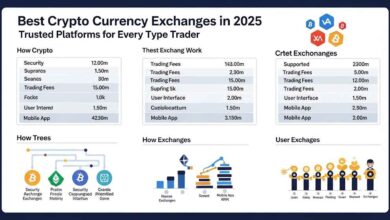The vast number of overnight millionaires Bitcoin has produced can make you address serious inquiries regarding its potential and the chances you stand in the digital assets’ ecosystem. Over time, the evolving realm of blockchain and cryptocurrency has seen both incredible Bitcoin success stories and bankruptcy cases.
What differentiates those who thrive from those who fail is, first of all, winning psychology. Unlike the countless traders who succumb to the grip of fear and greed, the truly successful ones have cultivated mastery over emotions and set a real goal from the start, analyzing the coin’s profile and constantly reviewing crypto news and regulations.
If you want to know how to buy Bitcoin, you must first build a foundational understanding of the essential concepts that influence this asset’s fluctuations. Its volatile nature requires thorough research and careful planning.
Cryptocurrency and Blockchain: What are they, and how do they work?
Cryptocurrency is a digital asset developed with the help of blockchain technology that enables anyone to send and receive payments. It doesn’t rely on central banks to verify transactions, has consensus mechanisms that validate transactions and mark them as authentic, and is theoretically immune to government intervention or manipulation.
Cryptocurrencies generally exist on decentralized networks that use blockchain technology – a digital ledger that firmly stores chronicles across a network of computers, ensuring transparency, immutability, and tampering resistance. In short, after decades of computer science and mathematical innovations, blockchain technology now makes cryptocurrency immune to any monopoly, creating a digital realm where anyone can participate.
According to market capitalization, the most popular cryptocurrencies are Bitcoin, Ethereum, Tether, and Solana. When it comes to the buying process of cryptocurrency, people generally choose between a traditional broker or a dedicated cryptocurrency exchange. You should keep in mind that:
- If you’d rather choose a simple investment experience and convenience, it means a traditional broker is your best option.
- If you seek control over your wallets, advanced trading tools, and various crypto offerings, then a dedicated cryptocurrency exchange will work best for you.
Centralized Exchange (CEX) vs Decentralized Exchange (DEX): What are the key differences?
CEXs (Centralized Exchanges) such as Binance or Coinbase act like middlemen and enable you to manage trades and funds, whereas DEXs (Decentralized Exchanges) allow you to trade directly from your wallet through decentralized exchange platforms like Uniswap and PancakeSwap, giving you full control and privacy.
Regarding CEXs, you must consider the following aspects:
- These platforms facilitate beginner investors, who are usually overwhelmed by the technical complexity and extreme volatility of the crypto landscape. They have developed intuitive interfaces specially designed to simplify the processes of buying, selling, and managing crypto. Moreover, CEXs provides customer support and a social security system for those who might have the misfortune of losing access to their accounts.
- Due to the large amount of user funds CEXs hold, they are prime targets for hackers. Unfortunately, several hacking attempts have resulted in significant losses, and now you have to follow best security practices. These include a strong, unique password, two-factor authentication (2FA), and a skeptical attitude toward phishing emails.
As for DEXs, you might be interested in the following points:
- Unlike CEXs, which are highly regulated and impose weighty identity verification requirements, DEXs allow users to trade anonymously and don’t require personally identifiable information. You’re in complete control of your assets, and your wallet is directly conducting trades. When network conditions are favorable, DEXs have lower overall fees.
- When choosing to trade through a DEX, you’re fully responsible for any potential damage or inquiries you need to address. There’s no customer support service to help you. DEXs are generally for those who are proficient in managing wallets, navigating blockchain, and dealing with gas fees.
Bitcoin: What is it, and where did it come from?
Bitcoin is a form of digital money that first served as an electronic mailing list for programmers who study secure communications (also known as cryptographers). One year later, in 2009, Satoshi Nakamoto mined the first block, marking the start of the blockchain’s evolution.
Bitcoin had basically no monetary value at the beginning, and it’s tough to find a major rise in its value until Nov 2013, when it accounted for $350-$1242. However, it was 2021 when Bitcoin took less than one month to overcome its 2020 price record (which closed at $28,993 on Dec. 31), surpassing $40,000 by the first seven days of Jan 2021. The particular price hike of Bitcoin in 2021 was linked to the launch of Tesla and Coinbase.
The reality may be harsh, but if you had purchased $20 in Bitcoins in 2009, your investment would have turned into a staggering $1.4 billion today.
Bitcoin Halving: What does it mean and how much does it matter?
About every four years, Bitcoin’s block reward is reduced by 50%. This decreases the supply of bitcoins entering the market while increasing its scarcity. This event is known as Bitcoin Halving.
The coin is designed to have a finite supply of 21 million BTC, and if it weren’t for the Bitcoin Halving, a controlled release of new bitcoins until all are in circulation wouldn’t have been possible.
Halving has indeed negative effects for Bitcoin miners, short-term traders, and market participants. As for long-term investors, Halving isn’t that tragic. It stands as a potential catalyst for price appreciation and has a long history of fueling speculative behaviors, with many investors anticipating potential gains and hurrying to accumulate Bitcoins.
The value of Bitcoin as an investment: Can Bitcoin really make you a millionaire ?
As Bitcoin has a market capitalization of $1.6 trillion and its limited supply creates scarcity, numerous individuals consider it has a vast potential to increase its value over time and offer significant returns. Adding Bitcoin to your investment portfolio is the dream of many, but you should know that a successful outcome requires planning, patience, and discipline.
Bitcoin has already made many millionaires, and if you aspire to become one of them, you must perform thorough market research and be aware of the risks implied. Investing in Bitcoin is mainly for those who have a high-risk tolerance and are already in a strong financial position.
However, this common belief does not ruin your chances of becoming the next Bitcoin millionaire. As long as you acknowledge its tendency to become incredibly volatile and approach it thoughtfully and strategically, you can easily maximize potential gains – this is a principle that applies to all cryptocurrencies. Furthermore, we’ve crafted a list of alternative ways that help you gain exposure to this dynamic asset with ease, avoiding the complexities of direct ownership. Let’s take a look at the following approaches:
- ETFs (Exchange-traded funds) are a type of investment fund that tracks the performance of popular market indices one-to-one. Basically, ETFs are collections of numerous investment products, such as bonds, stocks, and other securities, congested into a single fund. They are an outstanding opportunity to acquire Bitcoin (and, if you’re interested, even other cryptocurrencies) without implying a direct purchase or holding of these assets. Several experts have stated Bitcoin ETF’s potential to outpace gold ETFs, as over the past 30 years, Bitcoin ETFs have surpassed more than 5,000 exchange-traded funds.
- Bitcoin Options are financial secondary contracts that offer active traders the option of buying or selling Bitcoin at a foreordained price (the strike price) on a specific future date (the expiration date). This right is acquired through the process of paying the seller a premium. Broadly speaking, Bitcoin Block Trade is a privately negotiated transaction executed entirely outside the public market. This ecosystem provides traders with the opportunity to exhibit downside sentiments and avoid negative values in risk reversals.
- Crypto Stocks are an alternative way of acquiring Bitcoin, such as investing in the stocks of enterprises that are profoundly emerging in cryptocurrency-related services and own substantial Bitcoin assets. As an example, MicroStrategy (MSTR), a business intelligence firm, is one of the several publicly traded firms that offer investors access to the crypto market through their investment in digital assets. This company is popular for its significant Bitcoin holdings and generally for its advocacy for cryptocurrency embracement. Tesla (TSLA) is another example of a company that has invested strongly in Bitcoin, providing a way to benefit from Bitcoin’s huge potential to grow through the trading of its resources on traditional trading platforms. Crypto stocks are now an approach that, in addition to eliminating the complexities of direct ownership of Bitcoin, allows devoted traders to build a diversified portfolio in the extensive cryptocurrency ecosystem.
Final Thoughts
As Bitcoin continues to experience high fluctuations in value on a weekly basis, its future looks promising yet uncertain. Many see it as a financial safe haven. Still, it would be wise to learn as much as possible about cryptocurrencies and blockchains, selecting only the ones you see as an enduring opportunity.





